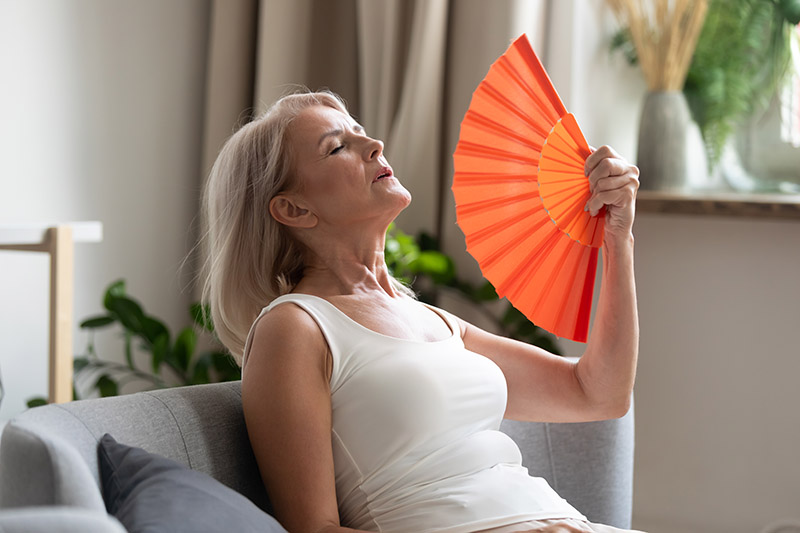Midlife is full of surprises – and not all of them are good.
If you are reading this, I’m guessing that you are touched in some way by symptoms of the menopause – or more accurately, the transition to menopause.
Until recently, when celebrities like Davina McCall and the Countess of Wessex started speaking out about their experiences, menopause was the silent shame. Yet experts reckon that 80% of women experience the symptoms of menopause.
It might be that you are really suffering or perhaps you’ve just started noticing some changes. The
experience is different for every woman but often means being hot, cold, moody, tired, sleep-deprived, nervy, irritable, sad, or hairy. It can mean hot flushes, memory loss, and a seemingly immovable band of fat around the middle and thighs.
Your fluctuating hormones are the cause of all of this, but you don’t have to accept these symptoms as the way things need to be. Learning to rebalance your hormones naturally will help you take back control of your life. Given life expectancy increases, women can expect to spend at least a third of their life ‘menopausal’, so it’s really worth getting the help you need now. Despite what you might have feared, menopause is not the death of your youth or vitality, but the start of some of the best and most powerful years of your life.
The menopause has many symptoms including:
- Night sweats
- Erratic menstrual cycle
- Stubborn weight gain
- around the middle
- Insomnia
- Bloating
- Cravings
- Headaches/ Migraines
- Overwhelm
- Mood swings
- Anxiety/ Depression
- Brain fog
- Poor memory
- Loss of sex drive
- Vaginal dryness
- Aging skin (and hair)
- Joint pains
- Fatigue
- Irritability
Follow these simple tips to help you through
Watch what you eat
One of the tragedies about menopause is the realisation that you really cannot get away with eating
the same foods you used to. Your body has changed, and you need to learn to eat for this new way of being.
The drop in oestrogen levels that occurs during menopause has a side effect of redistributing
body fat and excess pounds start to settle around the waist.
It’s more important than ever to switch to a low GL (glycaemic load) diet that balances your blood sugar levels. This means you will be eating foods that do not trigger insulin secretion in response to what you eat.
Focus on REAL food
Your diet should include meat, fish, eggs, tofu, lentils, beans and chickpeas, lots of veg, some fruit, nuts, seeds and wholegrains.
Eat phytoestrogens
Phytoestrogens are plant-based chemicals that are structurally similar to oestrogen and exert a weak oestrogenic effect.
They include soy beans, lentils, beans, chickpeas, tofu, barley, rye, oats, alfalfa, apples, pears,
carrots, fennel, onion, garlic, sunflower seeds, flaxseeds, liquorice root. (If you have any allergies or intolerances to any of these foods, please avoid)
Manage your stress
Cortisol is one of the main stress hormones and it can make you fat, and feel both tired and miserable as well as using up stores of important vitamins.
Apart from your fat cells, the only source of oestrogen after your ovaries stop making it is the adrenal glands, which is where the stress hormones are made.
Self care in your 40s and 50s is no longer a ‘nice thing to do’, it is essential for managing symptoms of the transition to menopause.
Do the right kind of exercise
Try to avoid very intense forms of exercise that stress the body.
Instead go for Yoga, Pilates, Zumba or walking. Resistance and strength exercise
is also good to help with the loss of muscle.
Avoid toxic chemicals
Chemicals in your body care products (shampoo, conditioner, body wash, body lotion and other moisturisers) contain chemicals like parabens, sodium lauryl/laureth sulphate, ureas etc.
These are synthetic forms of oestrogen that are known Endocrine Disrupting Chemicals and they place an additional stress on the body at a time when you are already coping with so much.
Get better sleep
As you work on a diet and lifestyle plan to get your hormones back into balance, better sleep will
start to follow. Try to set a bedtime routine by going to bed at the same time every night, avoiding caffeine and alcohol before bedtime and keep your bedroom as dark as possible.
If any of this has got you thinking that you need a little more support, please contact me for a FREE 20 minute consultation call. Details are on the website.

